
No. 16, 2021 | 1 October 2021
Go to:
From FRSA's Executive Director
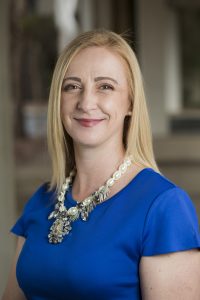
It certainly feels like the weight of lockdown in many states and territories is starting to lift. With that comes a feeling of welcome relief in many respects of life but ongoing uncertainty in others. News emerging out of Canberra that there will be a sharp scaling back of the Commonwealth’s Disaster Payments feels a bit like people are being caught in the crossfire between the Commonwealth and State/Territory governments. The Commonwealth holds the purse strings keeping individuals and families afloat who have been significantly impacted by job losses/reduced capacity to work due to COVID lockdowns while the States/Territories control the pathway out of lockdown. Given the industries that have been most impacted – hospitality, retail, tourism, travel – will likely still need to comply with social distancing measures, it is highly probable that the rate of underemployment will remain high. This will inevitably impact on individual and household income levels. Therefore, linking withdrawal of this payment to vaccination targets alone (notwithstanding exemptions for LGAs in lockdown) does feel harsh.
There are numerous reports now emerging providing clearer insight into the health and wellbeing of women, men and children in society due to COVID-19. We have featured a number of these in this ebulletin edition. What these reports are all telling us, overwhelmingly, is that people are doing it tough across a range of social and economic domains. Whilst appreciating the pressure on Government to scale back expenditure, I am concerned that the sharp withdrawal of payments will add more pressure to individuals and families who are already under significant strain.
As we head into the month of October I want to highlight Anti-Poverty week, which will be held from the 17th. This week provides an opportunity to remind ourselves and our society about the significant benefits the JobSeeker Coronavirus Supplement payments made to people in receipt of JobSeeker when they were receiving it from April 2020 to March 2021. Since that time, the majority of people relying on income support have not been eligible for disaster relief payments, and the impacts have been devastating. We know that income inadequacy and inequity underpins so many social issues in society. Reading in our ebull today about the University of Southern Queensland’s research correlating low-income households with the mental health of Australian adolescents is heartbreaking. The Anti-Poverty week website is a wealth of information – some of it quite heartening if the political will to create a fairer society could be ignited. Recent modelling by the ANU, for example, shows a 20% increase in working age payments like JobSeeker would reduce their poverty rates by as much as 75%. Surely that is an aspiration that should not be out of reach?
Thank you again for your tireless work supporting children, women, men and communities during this really challenging time. While it is difficult to ask for a slice of your expertise, experience and time when everyone is snowed under, I do want to remind FRSA members that Board nominations are now open (more on this below).
Don’t hesitate to reach out to us here at FRSA if we can be of help in anyway.
Kind regards,
Jackie Brady
FRSA Executive Director
Historic commitment to transfer out-of-home care services to Aboriginal and Torres Strait Islander communities
 Life Without Barriers has announced an historic commitment to transfer its out-of-home care services for Indigenous children to Aboriginal and Torres Strait Islander community controlled services over the next decade. Life Without Barriers has partnered with SNAICC – National Voice for our Children, who will assist them in guiding this transition process. This commitment is aimed at reducing the substantial over-representation of Aboriginal and Torres Strait Islander children in out-of-home care in line with the National Agreement on Closing the Gap.
Life Without Barriers has announced an historic commitment to transfer its out-of-home care services for Indigenous children to Aboriginal and Torres Strait Islander community controlled services over the next decade. Life Without Barriers has partnered with SNAICC – National Voice for our Children, who will assist them in guiding this transition process. This commitment is aimed at reducing the substantial over-representation of Aboriginal and Torres Strait Islander children in out-of-home care in line with the National Agreement on Closing the Gap.
SNAICC CEO Catherine Liddle stated that “this partnership heralds a new beginning for Aboriginal community-controlled organisations that serves to empower Aboriginal and Torres Strait Islander decision-making”. Read more.
Born into The Climate Crisis report
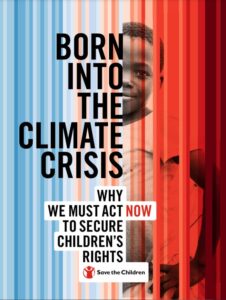 Save the Children has released a new report, Born into The Climate Crisis: Why we must act now to secure children’s rights, which warns that climate change is inextricably linked to wider issues of inequality and failures to uphold children’s basic rights.
Save the Children has released a new report, Born into The Climate Crisis: Why we must act now to secure children’s rights, which warns that climate change is inextricably linked to wider issues of inequality and failures to uphold children’s basic rights.
The report highlights the lifetime exposure to a range of extreme climate-related events on children born in 2020 compared to people born in 1960. The report also outlines the devastating impact of the climate crisis on children if urgent action is not taken, and features first-hand accounts from children in 11 countries on how climate change is impacting their lives, as well as recommendations on how to fight it.
Australia lockdown lows hit all time high
 Almost two thirds of Australians believe that their life has gotten worse during the pandemic and more than half are feeling more negative about the future compared to the first wave of infections, according to new analysis from The Australian National University. In a survey of more than 3000 people in Australia, roughly half said they were more stressed and more than a quarter said their relationship had got more difficult or strained this year compared to 2020.
Almost two thirds of Australians believe that their life has gotten worse during the pandemic and more than half are feeling more negative about the future compared to the first wave of infections, according to new analysis from The Australian National University. In a survey of more than 3000 people in Australia, roughly half said they were more stressed and more than a quarter said their relationship had got more difficult or strained this year compared to 2020.
“The dramatic changes in the past four months have led to declines in life satisfaction, worsening in psychological distress and an increase in loneliness across Australia,” co-author of the study ANU Professor Nicholas Biddle said.
“NSW in general and Sydney in particular has experienced the worst of the change, but many other parts of the country have also been impacted.” Read the full paper.
New research: Two in five Australians’ mental health impacted by COVID
 The Australian Red Cross has released new research, which found two in five Australians say their mental health has been negatively impacted by COVID-19. A similar number say they feel less hopeful about the future, and 37% feel less secure and safe.
The Australian Red Cross has released new research, which found two in five Australians say their mental health has been negatively impacted by COVID-19. A similar number say they feel less hopeful about the future, and 37% feel less secure and safe.
The survey of 1013 people around Australia in July was commissioned by Red Cross as part of its annual campaign to encourage people in Australia to prepare for disasters ahead. Read more.
Locked out in lockdown: September Update
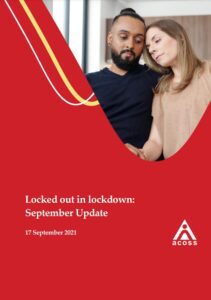 ACOSS has released the latest update of its Living in Lockdown survey, which finds that almost all of the 216 respondents – all of whom are on income support – were seriously struggling with the cost of living and almost half (41.5%) were at risk of homelessness because of the high cost of housing.
ACOSS has released the latest update of its Living in Lockdown survey, which finds that almost all of the 216 respondents – all of whom are on income support – were seriously struggling with the cost of living and almost half (41.5%) were at risk of homelessness because of the high cost of housing.
Key Findings:
- 96% are struggling with living costs
- 85% are ineligible for the COVID disaster payments
- 41.5% are at risk of homelessness
- 40% feel less safe
Poorer families have unhappier teens, study finds
 Australian teenagers who live in low-income households are more likely to experience poor mental health, new research from the University of Southern Queensland has found.
Australian teenagers who live in low-income households are more likely to experience poor mental health, new research from the University of Southern Queensland has found.
The research, published in PLOS ONE, examined data from the Telethon Kids Institute’s Young Minds Matter survey of 2500 Australian adolescents aged 12-17. It found adolescents from families with lower incomes have a higher risk of suffering from mental health problems, including bullying victimisation, mental disorders, suicidal ideation and suicide attempts, compared to those from richer families.
The research, titled Estimating income-related and area-based inequalities in mental health among nationally representative adolescents in Australia: the concentration index approach can be viewed online here.
FRSA National Conference 2022 - CALL FOR ABSTRACTS OPEN!
FRSA acknowledges that there is some uncertainty about what Australia’s future will look like in the coming months. We are hopeful, however, that come 16-19 May 2022 we will be in a position to convene the FRSA National Conference in Adelaide. We know the sector is eagerly awaiting the day we are able to meet again for this event, face-to-face, to engage in the rich experience of knowledge and networking that the FRSA National Conference delivers.
The theme for the FRSA National Conference 2022 – Together we can: Connect, Innovate, Transform – captures the spirit, resilience and adaptivity of the family and relationship services sector
As social service organisations we are always at the cutting edge of emerging trends and changes in society – for the Family and Relationship Services Sector, especially for vulnerable children, families and communities.
This last year and a half demonstrated the sector’s ability to adapt and respond like never before. The FRSA Conference presents a great opportunity for you to showcase the work that you do. We welcome abstracts that touch on how Together we can: Connect, Innovate, Transform to achieve better outcomes for Australian children, families and communities. This includes how we can better use technology, be more innovative, build our workforce capacity, and measure and increase our service delivery success. Together, we will also explore new collaborative ways practitioners, policy-makers and researchers can work together, including by taking a more coordinated prevention and early intervention public health approach. FRSA welcomes abstracts reflecting on the theme.
The Call for Abstracts closes COB Monday 1 November 2021. For more information, or to submit your Abstract, please visit the FRSA National Conference website
Stay up to date by subscribing to our Conference and Forum Updates.

Community Services Ministers’ Meeting
Community Services Ministers met via videoconference on 17 September 2021.
Ministers discussed the draft of Safe and Supported: The National Framework for Protecting Australia’s Children 2021-2031.
Ministers agreed in-principle to the new National Framework and agreed they would provide formal and final endorsement of the new National Framework in the coming weeks and launch the new National Framework in November 2021 and the first Indigenous-specific five-year action plan will be finalised by March 2022. Read more.
Proposed harsh Regulations for the charitable sector – update
In an August edition of the eBulletin, FRSA wrote about our concerns about harsh new regulations for the charitable sector proposed by federal Assistant Treasurer Michael Sukkar through amendments to the Australian Charities and Not-for-profits Commission Regulation 2013. We also voiced these concerns in a letter to all parliamentarians, urging them to oppose the proposed amendments.
If enacted, these new regulations would mean that charities could be deregistered for even the most minor offences and they would give the Charities Commissioner the power to shut down a charity if the Commissioner believes that a minor breach is likely to happen in the future.
It seems that the Parliamentary Standing Committee for the Scrutiny of Delegated Legislation, shares the concerns of the charitable sector, recommending the regulations be put to rest in its latest report, published 29 September.
The Committee, chaired by Liberal Senator Concetta Fierravanti-Wells, said it intended to give notice of a motion to disallow the changes on 18 October.
We remain hopeful that the regulations – which threaten the valuable contribution of charitable organisations, effectively silencing our sector (and the vulnerable and disenfranchised) – will not see the light of day.
Australia’s Welfare 2021: In brief
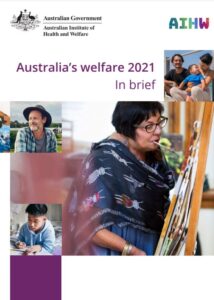 On 16 September, the Australian Institute of Health and Welfare (AIHW) released its 15th biennial welfare report, Australia’s welfare 2021: in brief. The report describes key findings on 43 different welfare topics including housing, education and skills, income and employment, social support, justice and safety, and Indigenous Australians, as well as the impact of COVID-19 on welfare.
On 16 September, the Australian Institute of Health and Welfare (AIHW) released its 15th biennial welfare report, Australia’s welfare 2021: in brief. The report describes key findings on 43 different welfare topics including housing, education and skills, income and employment, social support, justice and safety, and Indigenous Australians, as well as the impact of COVID-19 on welfare.
Notably, findings in the report showed that 1 in 6 women (1.6 million) have experienced physical or sexual violence by a current or former partner since the age of 15. Further, an online survey of 15,000 women found in the 3 months to May 2020, 65% of the 4.6% of women experiencing family and domestic violence reported that the violence had started or escalated since the start of the COVID-19 pandemic.
Many of the extra challenges faced by families due to the COVID-19 pandemic have also meant that some children have been more vulnerable to abuse and neglect. Currently, 1 in 32 (174,700) children in Australia receive child protection services.
The full report and snapshots can be found here.
New resource for separating couples dealing with debt
The government has announced a new resource for separating couples that provides practical information on managing debts post separation, with the aim of achieving fair outcomes. Separating with debt: a guide to your legal options has been released as part of a commitment under the National Plan to Reduce Violence against Women and their Children 2010-2022 in order to address the imbalanced responsibility often placed on women post separation, particularly those leaving relationships where there is financial abuse. This four-part guide outlines consumer credit and debt law options and provides information about services to assist individuals who are concerned about their safety or experiencing financial abuse.
You can find the guide on the Attorney-General’s Department website.

FRSA Board Election nomination process now open
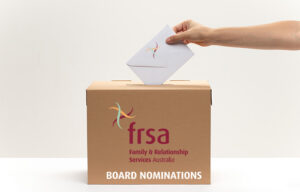 FRSA Board nominations are now open through until 2pm on Friday, 9 October 2021.
FRSA Board nominations are now open through until 2pm on Friday, 9 October 2021.
In 2021/2022, there will be four positions on the FRSA Board open for nomination. The positions held by the following people will be declared open (with all current Directors eligible for further term):
- FRSA Board Chair, Ms Glenda Devlin
- FRSA Treasurer and Chair of the Finance, Risk & Governance Committee, Mr Serge Sardo
- FRSA Board Member, Ms Leanne Strommen
- FRSA Board Member, Ms Allison Wainwright
The FRSA Board consists of seven member elected Directors with provision in the Constitution of up to two co-opted Directors (which are currently filled). Each FRSA Board position is for a two year term (maximum three consecutive terms) with Full Board meetings held approximately four times a year, typically in Canberra, home of the National Office. The work of the Full Board is supported by a number of Committees: the Finance, Risk and Governance Committee; the Research and Policy Committee and the Sector Events Committee.
To be eligible for Nomination, you must be a Director, Secretary or Employee of a current financial Full Member or a current financial Associate Member of Family and Relationship Services (FRSA). Only Full Members of FRSA, are eligible to nominate. They must also be current financial Members. A Full Member shall not nominate more than one Candidate for Election as a Director. Intending Nominees/Candidates should familiarise themselves with the FRSA Constitution, and verify their financial status and any other qualifications prior to lodging Nominations.
For more information regarding the nomination process, please contact on us 02 6162 1811 or via email me at ExecDirector@frsa.org.au.
Like This - Documentary screening
 Child Wise and House of Muchness invite you to their first free online screening of “Like This”, a documentary that exclusively features young people’s voices about life online, and the risks and benefits of social media. You’ve probably seen and heard lots in the media about how bad social media is for kids and its dangerous dark side. But how much of it has come from the opinions and mouths of young people themselves?
Child Wise and House of Muchness invite you to their first free online screening of “Like This”, a documentary that exclusively features young people’s voices about life online, and the risks and benefits of social media. You’ve probably seen and heard lots in the media about how bad social media is for kids and its dangerous dark side. But how much of it has come from the opinions and mouths of young people themselves?
“Like This” is full of messages for all of us to hear: parents, politicians, social media companies or people who just care. And it’s finally through the words and voices of the people who matter most, but we rarely hear from.
Date and time: Thursday, 28 October at 6PM – 7.30PM (AEDT)
Save your spot here. The screening will be followed by Q&A with the young participants afterwards.
Victorian Protecting Children Awards
 Congratulations to the FRSA members who were winners and highly commended at the 2021 Victorian Protecting Children Awards in early September.
Congratulations to the FRSA members who were winners and highly commended at the 2021 Victorian Protecting Children Awards in early September.
The awards recognise practitioners, workers, carers and community members from across all areas of the Victorian child and family services system.
Read the list of winners and highly commended below:
- OzChild’s Kristine and Rick Foord won the Carer Award, which recognised past and present accredited foster or kinship carers who have made a significant contribution to the lives of children and young people where child protection has been involved in formal foster care. Read more.
- Kids First Australia’s Caring Dads program won the Minister’s Award for Innovation in Protecting Children. This award recognised an individual, team or group demonstrating innovative approaches and creative intervention to achieve the best possible outcomes for children, young people and their families. And CEO Aileen Ashford was highly commended for the Robin Clark Leadership Award, which recognises an individual, team, or group at any level of leadership who inspires others to act wisely and care deeply about achieving the best outcomes for children, young people and their families.
- MacKillop Family Services’ team at Staughton Road were awarded the Robin Clark Making a Difference Award, which recognised the team’s exceptional contribution to directly improve the lives of children, young people and families in Victoria. This can be in partnership or collaboration with government and non-government agencies. Their Power to Kids: Respecting Sexual Safety project were also highly commended for the Minister’s Award for Innovation in Protecting Children. Read more.
- Child and Family Services Ballarat’s Youth Services team was highly commended for the Supporting Young People in Care Award, which recognised an individual, team or group that goes above and beyond to support young people experiencing vulnerability. Read more.
 FRSA would like to give a special congratulations to Luke Rumbold CEO of Upper Murray Family Care (UMFC) and former FRSA Board Director (2007- 2012) on being awarded the inaugural Leaving a Legacy Award.
FRSA would like to give a special congratulations to Luke Rumbold CEO of Upper Murray Family Care (UMFC) and former FRSA Board Director (2007- 2012) on being awarded the inaugural Leaving a Legacy Award.
The award was launched by the Centre for Excellence in Child and Family Welfare, Victoria’s peak body for child and family services and recognises the people who have made a significant contribution to the child, youth, and family services sector throughout their career as well as making an impact on their local community. ‘Leaving a Legacy’ acknowledges those who have positively contributed to the sector and whose remarkable achievements should be highlighted.
Luke has devoted his life to the care of children and young people in rural Victoria during his 40-year career. Graduating as a Social Worker from the University of Melbourne in 1980, Luke was first employed as a Community Based Case Worker by Mallee Family Care in Kerang. In 1984, Luke moved to Wodonga to take up the role of Director of Upper Murray Family Care.
With 37 years at the helm, it is rare for an individual to leave such an enduring and remarkable footprint on an organisation and their local community. As well as expanding its reach to become a cross-border organisation, UMFC also extended its services from legal and family law to disability care and child and family services. FRSA commends his lasting legacy at UMFC, his local community, and throughout regional Victoria.

Interrelate appoints new Chief Executive Officer
 Interrelate has announced the appointment of Graeme O’Connor as its new Chief Executive Officer.
Interrelate has announced the appointment of Graeme O’Connor as its new Chief Executive Officer.
Graeme has been Acting CEO since March this year following the departure of former CEO Patricia Occelli. Graeme has been part of Interrelate’s executive management team since 2005, most recently as Head of Corporate Services. Over the last 16 years, Graeme has played a significant part in furthering Interrelate’s purpose, values, culture and brand. Read more.
AIFS farewells Deputy Director, Research
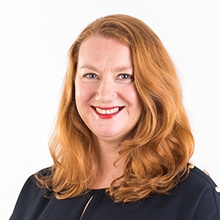 The Australian Institute of Family Studies (AIFS) are bidding farewell to Deputy Director, Research, Kelly Hand after more than 20 years of service at AIFS and 5 years as Deputy Director.
The Australian Institute of Family Studies (AIFS) are bidding farewell to Deputy Director, Research, Kelly Hand after more than 20 years of service at AIFS and 5 years as Deputy Director.
FRSA has had the pleasure of working with Kelly on a number of different projects over the years and wishes her all the best for the future.
EACH appoints new CEO

EACH has announced that Natalie Sullivan has been appointed to the role of CEO.
Natalie has over 20 years of executive experience across public, private and not for profit health and human services. She was previously in the role of Chief Operating Officer at Scope. Prior to joining Scope, Natalie was Principal Consultant of Alpha Crucis Group, a high-performance, specialist consulting group built specifically to support health, aged care, disability and community sectors to achieve their strategic and operational goals. Previous to consulting, Natalie held executive roles across public and private health services including Cabrini Health & Eastern Health.

This is following the retirement announcement of current CEO Peter Ruzyla, who has been with EACH since 1989. At that time EACH operated from a single site with about 43 staff and 150 volunteers. In 2020, EACH offered 140+ programs throughout the eastern seaboard across 57 sites. Staff numbers have grown to 1300 and 250 volunteers with over 45,000 people receiving their support in that year alone. Peter will be continuing as CEO following a transition period in the last quarter of the year and we look forward to wishing him well into the future at the appropriate time.

Anti-Poverty Week 2021
 Anti-Poverty Week will be held from the 17-23 October 2021. This year the focus is on calling on the governments to unlock poverty for individuals, families, and children by raising income support above the poverty line and investing in social housing. In Australia today 2.65 million adults and children struggle to survive on income payments that are well below the poverty line, that’s over one in 10 Australians – including close to a million children (1 in 5) who are growing up in the poorest families. Many are at risk of homelessness due to a shortage of affordable housing.
Anti-Poverty Week will be held from the 17-23 October 2021. This year the focus is on calling on the governments to unlock poverty for individuals, families, and children by raising income support above the poverty line and investing in social housing. In Australia today 2.65 million adults and children struggle to survive on income payments that are well below the poverty line, that’s over one in 10 Australians – including close to a million children (1 in 5) who are growing up in the poorest families. Many are at risk of homelessness due to a shortage of affordable housing.
Parenting Orders Research Project – Closing Soon
 The Australian Institute of Family Studies is researching compliance and enforcement of family law parenting orders and invites parents and carers with parenting orders from the family law courts to participate in a survey. We also encourage you to share this information with your client base if you feel that it would be of interest to them. Click here to complete the survey.
The Australian Institute of Family Studies is researching compliance and enforcement of family law parenting orders and invites parents and carers with parenting orders from the family law courts to participate in a survey. We also encourage you to share this information with your client base if you feel that it would be of interest to them. Click here to complete the survey.
National Carers Week 2021

National Carers Week 2021 is coming up on 10-16 October. The week provides a time to recognise and celebrate Australia’s unpaid carers and all they do. This year’s theme is ‘Millions of Reasons to Care’ which aims to bring attention to the 2.65 million carers around the country who provide outstanding care and support to their loved ones.
Click here to find out more about the week and how to get involved.
World Mental Health Day
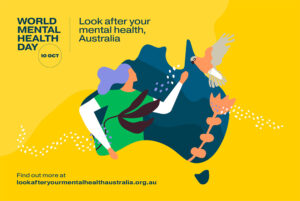 World Mental Health Day is on 10 October 2021. This year’s campaign has been developed with the aim of challenging negative perceptions around mental illness and encouraging people to prioritise their mental health and the mental health of their communities. This year’s message is simple: “Look after your mental health, Australia.” Support the campaign by making a #MentalHealthPromise at lookafteryourmentalhealthaustralia.org.au
World Mental Health Day is on 10 October 2021. This year’s campaign has been developed with the aim of challenging negative perceptions around mental illness and encouraging people to prioritise their mental health and the mental health of their communities. This year’s message is simple: “Look after your mental health, Australia.” Support the campaign by making a #MentalHealthPromise at lookafteryourmentalhealthaustralia.org.au
AIFS Conference - Call for abstracts closing soon
 Call for abstracts for the AIFS 2022 Conference closes on 14 October. They are looking for abstracts from a range of sectors and professions to fill their three-day program. Submissions can be made in five key sub-themes:
Call for abstracts for the AIFS 2022 Conference closes on 14 October. They are looking for abstracts from a range of sectors and professions to fill their three-day program. Submissions can be made in five key sub-themes:
- Family relationships
- Parenting, child development and caring
- Families and financial circumstances
- Family law
- Challenges for families.
You can submit an abstract for an oral presentation, e-poster, roundtable presentation or symposium.
Difficult Conversations-How To Talk to Adults About Almost Anything eWorkshop 30 October 2024
Effective Online Group Leadership
Webinar: What Works for Men? Engaging Men in Prevention
NSW
Couple and Family Counsellor | Relationships Australia NSW
Graduate Diploma in Family Dispute Resolution Scholarship (Aboriginal Identified) | Uniting NSW.ACT
Financial Counsellor & Case Coordinator | Relationships Australia Canberra & Region
VIC
Child and Family Worker | Kids First Australia
Clinical Practitioner | Kids First Australia

State of the nation in suicide prevention 2021 | Suicide Prevention Australia
 Record numbers of Australians are heeding the call to seek help from suicide prevention services in a ‘silver lining’ that shows the sector is making a major contribution to keeping the community safe, according to this report.
Record numbers of Australians are heeding the call to seek help from suicide prevention services in a ‘silver lining’ that shows the sector is making a major contribution to keeping the community safe, according to this report.
Working from home: research paper | Productivity Commission
 The COVID-19 pandemic has led to large-scale and rapid changes in work practices, including a dramatic increase in the number of people working from home. This report considers how decisions about location of work will be made as firms and workers continue to learn how to organise their work, and what an increase in working from home might mean for workplace regulation, urban centres and wellbeing more generally.
The COVID-19 pandemic has led to large-scale and rapid changes in work practices, including a dramatic increase in the number of people working from home. This report considers how decisions about location of work will be made as firms and workers continue to learn how to organise their work, and what an increase in working from home might mean for workplace regulation, urban centres and wellbeing more generally.
What is theory of change? | Child Family Community Australia
CFCA has released an Expert Panel Project resource, that responds to the question: What is theory of change? The resource explores reasons to develop a theory of change and outlines key theory of change elements. It includes examples and links to further resources.
From consumer to partner: rethinking the parent/practitioner relationship | Centre for Community Child Health, Murdoch Children’s Research Institute
Early childhood provides a critical opportunity for early intervention and prevention, but barriers to accessing services prevent children and families – often those with the greatest need – from gaining their benefit. This policy brief focuses on the nature and importance of partnerships between parents and professionals.
‘For my safety’: experiences of technology-facilitated abuse among women with intellectual disability or cognitive disability | Office of the eSafety Commissioner
 This research explores experiences of technology-facilitated abuse among women living with intellectual or cognitive disability. The findings are based on interviews with women with intellectual or cognitive disability and frontline workers who provide support services.
This research explores experiences of technology-facilitated abuse among women living with intellectual or cognitive disability. The findings are based on interviews with women with intellectual or cognitive disability and frontline workers who provide support services.
Prevalence of domestic violence among women during the COVID-19 pandemic | ANROWS
These fact sheets capture findings from the Australian Institute of Criminology’s survey of 15,000 women about their experiences of violence in the months (February to May 2020) when Australia first began to feel the impacts of the COVID-19 pandemic.
What’s age got to do with it? | Australian Human Rights Commission
 This report identifies stereotypes, attitudes and beliefs about age that prevail in Australia, and captures some of the ways in which people in Australia understand and experience their impacts.
This report identifies stereotypes, attitudes and beliefs about age that prevail in Australia, and captures some of the ways in which people in Australia understand and experience their impacts.
Dead ends: How our social security system is failing people with partial capacity to work | Brotherhood of St Laurence
This paper examines the development of this classification and its impact on the lives of individuals and their households. It recommends urgent policy change to enable those who are unable to work full-time due to disability or ill health to live with dignity.
Implementing evidence-informed programs and practices | Child Family Community Australia
These two videos are part of a suite of resources that aim to support organisations in the implementation of their programs. The videos are based on the publication Implementation in action: A guide to implementing evidence-informed programs and practices.
Want to submit something to the FRSA eBulletin?
If you have an news item or event that you would like to be featured in a future eBulletin please submit your announcement via the form below or email communications@frsa.org.au with the subject “FRSA eBulletin submission”.
Please note FRSA members receive priority for items posted in the eBulletin. And to keep information current, relevant and useful, submissions will not be repeated from week to week.
Subscribe
Subscribe to receive future eBulletin editions directly to your inbox!







